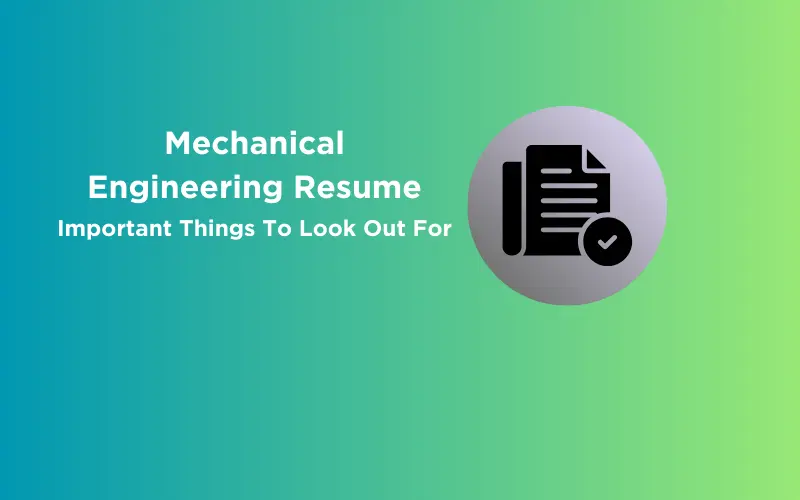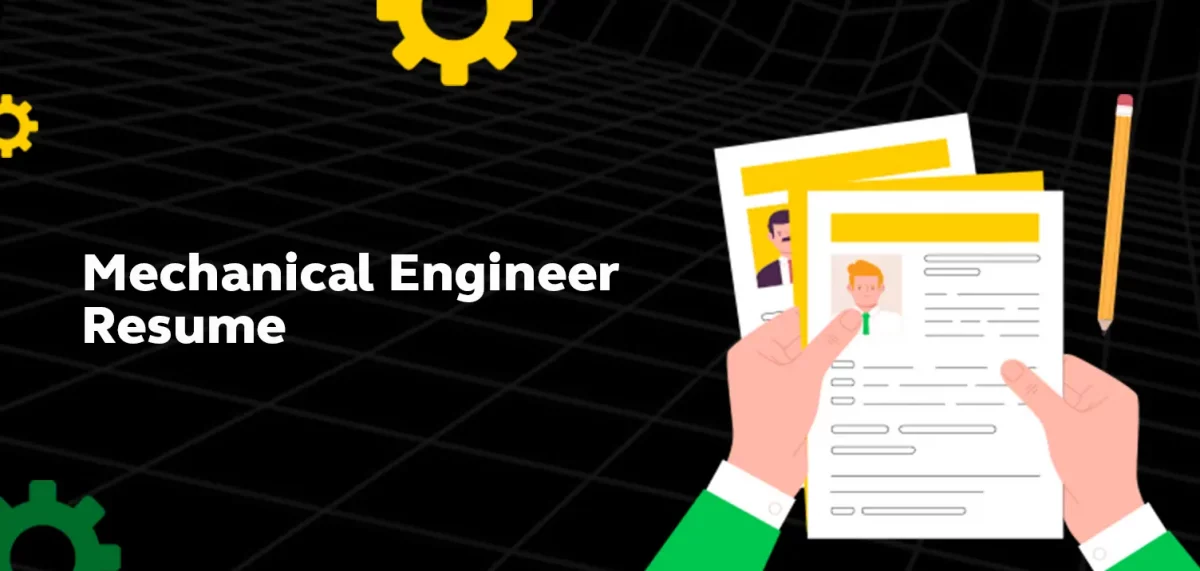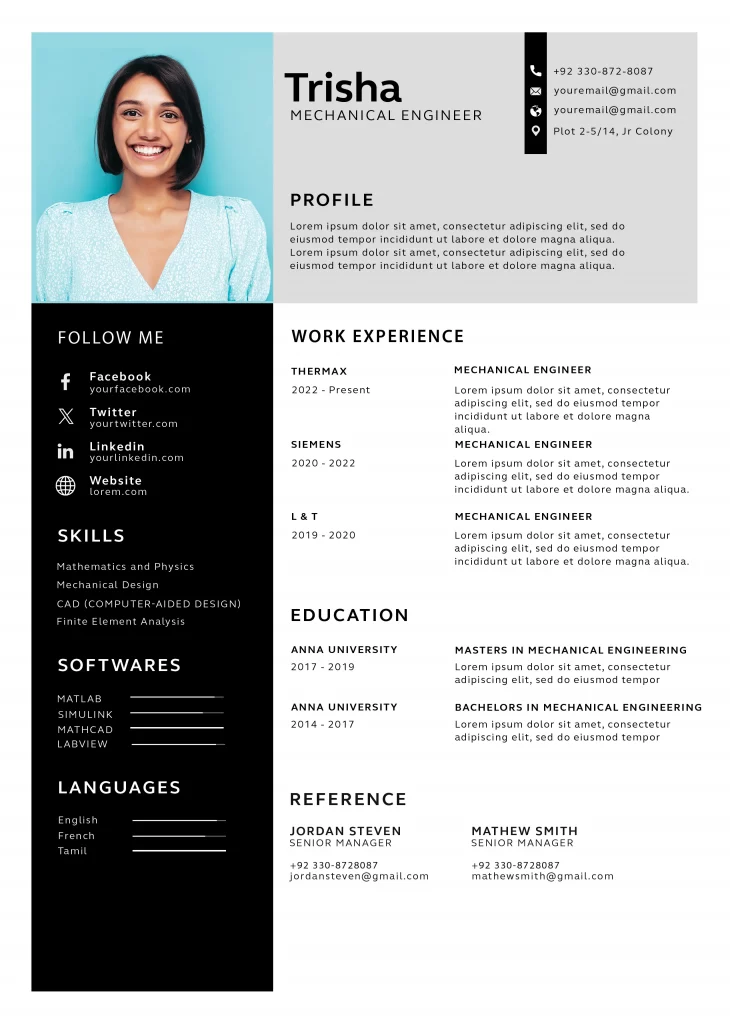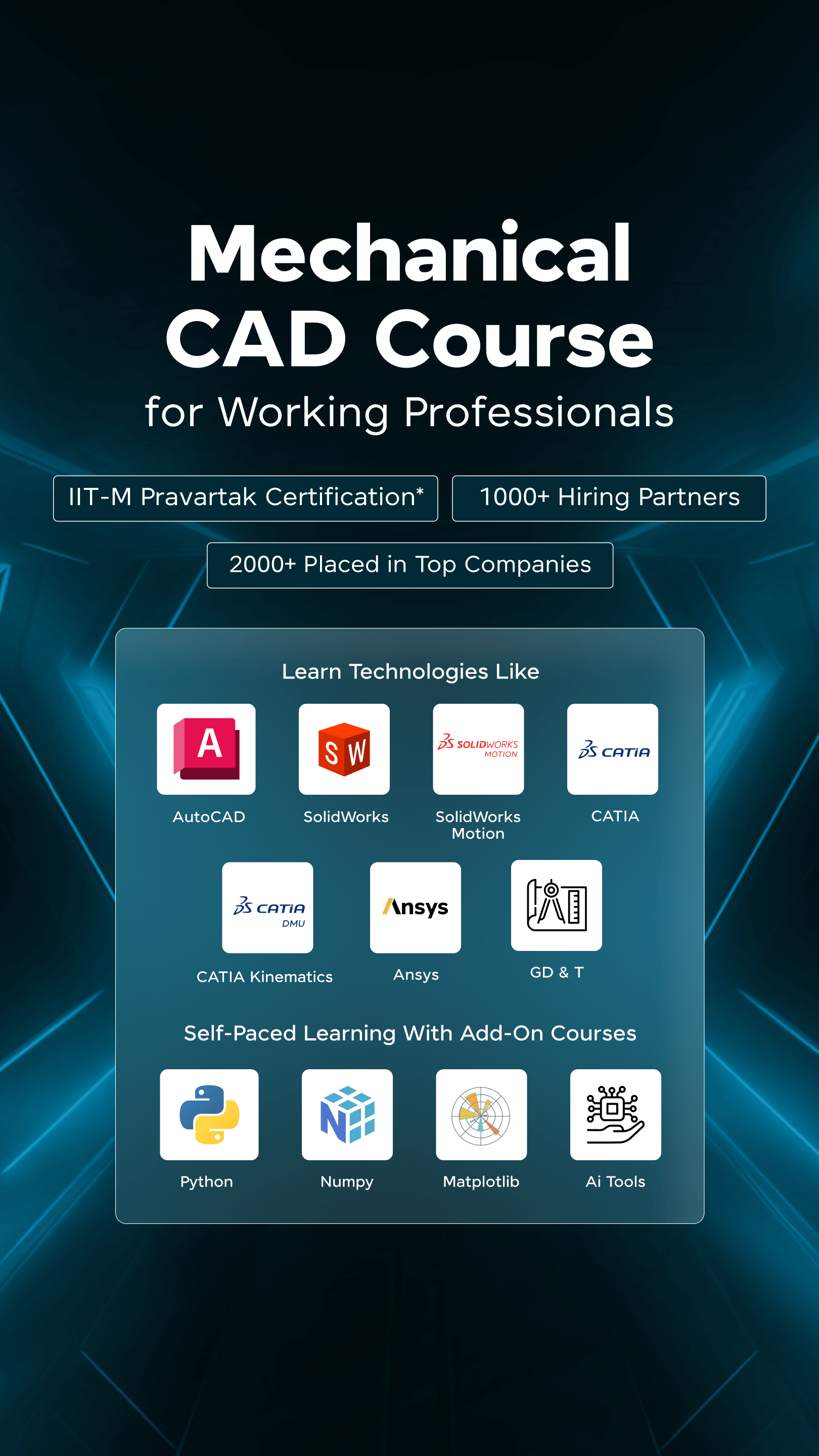
Mechanical Engineering Resume: 9 Important Things To Look Out For
Sep 04, 2024 3 Min Read 3277 Views
(Last Updated)
With the development of technology, most of us started forgetting about mechanical engineering which pioneered the whole industrial revolution. It definitely is a tough shell to crack but with the right mechanical engineering resume, it is not that hard.
Creating an effective mechanical engineer resume is crucial to showcase your skills, experience, and qualifications to potential employers. Your resume should be well-organized and provide a clear overview of your abilities and achievements.
If you don’t know about a professional mechanical engineering resume, worry not, you have come to the right place. In this article, you are going to learn how to make a professional mechanical engineering resume that instantly grabs the attention of the employer and you will also get to see an example template that can help you understand all of this stuff much better.
So, without any delay, let’s get started.
Table of contents
- Building a Professional Mechanical Engineering Resume
- Contact Information
- Objective or Summary
- Education
- Certifications and Licenses
- Skills
- Professional Experience
- Internships or Co-op Experience (if applicable)
- Projects (optional)
- Languages (optional)
- Formatting
- Example of a Professional Mechanical Engineering Resume
- Conclusion
- FAQ
- What should be included in a mechanical engineering resume?
- How can I make my mechanical engineering resume stand out?
- What are the future job prospects for mechanical engineers?
- How important is computer proficiency for a mechanical engineer?
- What soft skills should be added to a mechanical engineer resume?
Building a Professional Mechanical Engineering Resume

The scope of mechanical engineering is high these days as people start to come back to their roots. Within time, mechanical engineering will get competitive and it is important for you to have a well-built mechanical engineering resume prior to that.
A well-built mechanical engineering resume is one that contains information that is required and not unnecessary stuff. The idea of “a long resume will get you places” is totally wrong. The more crisp and content-oriented it is, the better your chances of landing a great job.
In this section, you will learn the things that need to be there in a mechanical engineering resume:
1. Contact Information
At the top of your resume, include your full name, phone number, email address, and location. Make sure your contact information is up-to-date and professional. This only allows the potential employers to contact you so it is important to keep updated on this from time to time.
Before we move on to the next part, you should have a deeper knowledge of key mechanical engineering concepts. You can consider enrolling yourself in GUVI’s CAD Program for Mechanical Engineers, which lets you gain practical experience by developing real-world projects and covers technologies including AutoCAD, Solidworks, CATIA, Ansys, GD & T, etc.
Additionally, if you would like to explore AutoCAD for Mechanical Engineering through a self-paced course, you can take GUVI’s AutoCAD Mechanical Certification Course.
2. Objective or Summary
This section of the mechanical engineering resume is all about yourself. A brief, well-crafted objective or summary statement can provide a snapshot of your career goals and what you bring to the table as a mechanical engineer. Highlight your key strengths and career aspirations.
3. Education
List your educational background, starting with the most recent degree earned. Include the institution’s name, location, degree earned, major, graduation date, and GPA (if strong). Mention any relevant coursework or academic honors as that can boost up your reputation.
4. Certifications and Licenses
It is important for you to have professionally certified courses related to mechanical engineering in your mechanical engineering resume. This ensures that you are willing to learn the subject and learn things out of your syllabus. Make sure to get professional certifications to gain a sweet spot in the employer’s heart.
5. Skills
It is important for you to acquire the required skills needed for a mechanical engineer and create a separate section containing all those skill sets. Mention your software proficiency (e.g., AutoCAD, SolidWorks, MATLAB), machinery knowledge, programming languages, and any other technical skills that are relevant to the job.
6. Professional Experience
This is a critical section in a mechanical engineering resume where you detail your work history. Each entry should include:
- Job Title: Your position at the company.
- Company Name: The name of your employer.
- Location: The city and state where the company is based.
- Employment Dates: Specify the start and end dates for each role.
- Key Responsibilities: Describe your roles and responsibilities as a mechanical engineer using bullet points. Emphasize your achievements and how you added value. Use action verbs to start each bullet point.
- Achievements: Highlight any notable accomplishments, projects you’ve worked on, and quantifiable results. For example, “Designed and implemented a new system that increased production efficiency by 20%.”
7. Internships or Co-op Experience (if applicable)
Include any relevant internships or co-op experiences. Follow a similar format as the professional experience section, focusing on skills and achievements gained during these opportunities.
8. Projects (optional)
If you’ve worked on significant mechanical engineering projects, you can create a separate section to describe them in detail. Include project names, your role, the project’s purpose, and the outcomes. This can really help you land a big job as working on a project means you have real-time experience and that is what most companies seek.
9. Languages (optional)
If you are proficient in languages other than your native language and it may be relevant to your work, you can include them here.
Formatting
Use a clean, professional format with consistent fonts and bullet points. Make sure your resume is easy to read and free of grammatical errors. Stick to a standard resume length (1-2 pages) and save it in a common format like PDF to ensure compatibility.
Customize your resume for each job application by emphasizing the skills and experiences that match the specific job requirements. Tailoring your resume can significantly increase your chances of landing the mechanical engineering position you desire.
Example of a Professional Mechanical Engineering Resume
As we mentioned earlier, it is time for you to see a professional mechanical engineering resume to understand the nuances and details that it holds. Here is one such type of mechanical engineering resume:

Kickstart your career by enrolling in GUVI’s CAD Career Program for Mechanical Engineers where you will master technologies including AutoCAD, Solidworks, CATIA, Ansys, GD & T, etc, and build interesting real-life mechanical projects.
Alternatively, if you would like to explore AutoCAD for Mechanical Engineering through a self-paced course, you can take GUVI’s AutoCAD Mechanical Certification Course.
Conclusion
In conclusion, your mechanical engineering resume is not just a piece of paper; it’s your ticket to unlocking a world of opportunities. Building a well-structured and compelling mechanical engineering resume is the key to making a strong first impression on potential employers.
By showcasing your skills, experience, and passion for innovation, you not only demonstrate your qualifications but also your dedication to the field. Remember to highlight your achievements, tailor your resume to each job application, and keep it clear and concise.
With the right mechanical engineering resume, you can open the door to exciting projects, innovative technologies, and a rewarding career in the field of mechanical engineering.
FAQ
A mechanical engineering resume should include your contact information, education, work experience, technical skills, projects, and relevant certifications.
To stand out, focus on showcasing your achievements, emphasize relevant skills and experiences, and tailor your resume to the job you’re applying for.
Mechanical engineering offers strong job prospects, with opportunities in various industries, including automotive, aerospace, energy, and robotics.
Computer proficiency, especially in CAD (Computer-Aided Design) software, is crucial for creating and simulating mechanical designs.
Soft skills such as teamwork, communication, problem-solving, and adaptability are crucial for success in the field.

























![Top Roles and Responsibilities of a Civil Engineer [2025] 6 Feature image - Top Roles and Responsibilities of a Civil Engineer](https://www.guvi.in/blog/wp-content/uploads/2023/09/Feature-image-Top-Roles-and-Responsibilities-of-a-Civil-Engineer-1.webp)





Did you enjoy this article?